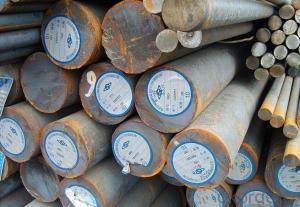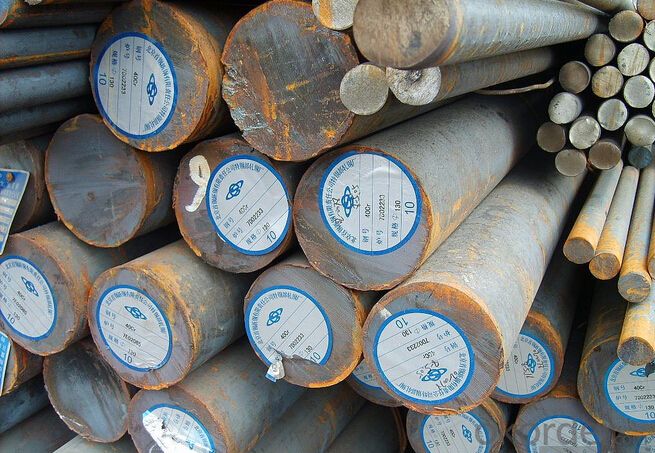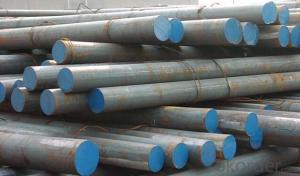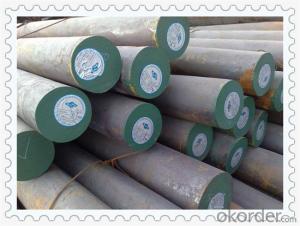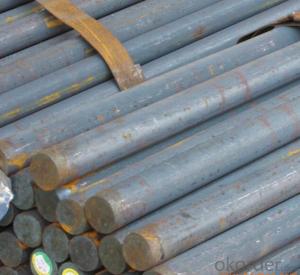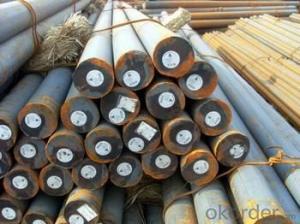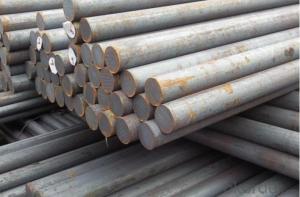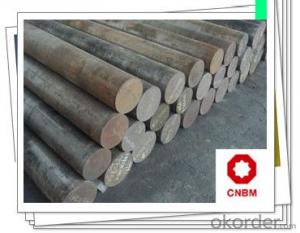Special Steel A36 Carbon Steel Round Bar
- Loading Port:
- China main port
- Payment Terms:
- TT or LC
- Min Order Qty:
- 25 m.t.
- Supply Capability:
- 10000 m.t./month
OKorder Service Pledge
OKorder Financial Service
You Might Also Like
Specification
The details of our Steel
1. Produce Standard: as the GB, AISI, ASTM, SAE, EN, BS, DIN, JIS Industry Standard
2. Produce processes: Smelt Iron -EAF smelt Billet - ESR smelt Billet -Hot rolled or forged get the steel round bar and plate
3. Heat treatment:
Normalized / Annealed / Quenched+Tempered
4. Quality assurance:
All order we can received Third party inspection, You can let SGS, BV,.. and others test company test and inspect our products before Goods shipping.
Product information
1. Main application
(1) this steel is widely used in machinery manufacturing.
(2) For the manufacture of high strength requirements parts, such as gears, shafts, piston pin and the uneven force big machining parts, forgings, stampings and bolts, nuts, pipe joint.
2. Specification:
Round bar | Diameter(mm) | Length (mm) | |
50~500 | 2000~5800 | ||
plate/sheet | Thickness(mm) | Width (mm) | Length (mm) |
20~400 | 80~1000 | 2000~5800 |
3. Delivery condition:
Acc. to your request—Standard steel bar(sawing)
——non-standard steel bar(sawing)
or Mill deliver condition,without sawing or cutting
Conventional or ESR, hot rolled or forged, black surface or milling
Hardness: annealed to HB≤215
4. Features:
(1) Higher strength in a high-quality carbon steel.
(2) Mechanical properties of this steel is very good.
(3) the hardeness of this steel could be 42~46HRC by quenching.
(4) due to poor hardenability, general normalized state, high mechanical performance requirements, the use of quenched and tempered.
(5) Moderate in cold plastic deformation, the machinability by annealing and normalizing is better than quenched and tempered.
5. Chemical analysis
C | Si | Mn | P≤ | S≤ |
0.14~0.22 | ≤0.30 | 0.30~0.65 | 0.045 | 0.045 |
6. Heat treatment (for reference)
quenching | tempering | tensile strength | yield strength | elongation |
820~870 °c | 550~650 °c | ≥600MPa | ≥355MPa | ≥16%
|
Main product
High speed steel | |
AISI | M2,M4,M35,M42,T1 |
DIN | 1.3343,1.3243,1.3247,1.3355 |
JIS | SKH51,SKH54,SKH35,SKH59,SKH2 |
Cold work tool steel | |
AISI | D2,D5,D3,D6,A8,A2,O1 |
DIN | 1.2379,1.2601,1.2080,1.2436,1.2631,1.2363,1.2510,1.2327 |
JIS | SKD10,SKD11,SKD1,SKS3 |
Hot work tool steel | |
AISI | H13,H11,H21 |
DIN | 1.2344,1.2343,1.2367,1.2581,1.2713 |
JIS | SKD61,SKD6,SKD7,SKD5SKT4 |
Plastic mould steel | |
AISI | P20,P20+Ni,420 |
DIN | 1.2311,1.2738,1.2083,1.2316 |
JIS | PDS-3,SUS420J1,SUS420J2 |
Alloy structural seel | |
AISI | 5140,4340,4135,4140 |
DIN | 1.7035,1.6511,1.7220,1.7225 |
JIS | SCr440,SNCM439,SCM435,SCM440 |
Stainless steel | |
AISI | 440C,420,430 |
DIN | 1.4125 |
JIS | SUS440C |
Carbon steel | |
AISI | 1045,1020 |
DIN | 1.1191 |
JIS | S45C, G3101 |
Product show

Workshop show

Shipping
1. FedEx/DHL/UPS/TNT for samples, Door-to-Door;
2. By Air or by Sea for batch goods, for FCL; Airport/ Port receiving;
3. Customers specifying freight forwarders or negotiable shipping methods!
Delivery Time: 3-7 days for samples; 5-25 days for batch goods.
Payment Terms
1.Payment: T/T, L/C, Western Union, MoneyGram,PayPal; 30% deposits; 70% balance before delivery.
2.MOQ: 1pcs
3.Warranty : 3 years
4.Package Informations: 1) EXPORT, In 20 feet (GW 25 ton) or 40 feet Container (GW 25 ton)
2)as customer's requirement
Why choose us?
(1) The leading exporter in China special steel industry.
(2) Large stocks for various sizes, fast delivery date.
(3) Good business relationship with China famous factories.
(4) More than 7 years steel exporting experience.
(5) Good after-sales service guarantee.
- Q: How does special steel perform in extreme environments?
- Special steel is specifically designed to perform exceptionally well in extreme environments. It has excellent resistance to corrosion, high temperatures, and mechanical stress, making it highly reliable and durable. Special steel also maintains its strength and integrity even in challenging conditions, ensuring optimal performance and longevity in extreme environments.
- Q: How is special steel used in the manufacturing of cutting tools?
- Special steel is used in the manufacturing of cutting tools due to its exceptional properties such as high hardness, toughness, and wear resistance. These qualities allow special steel to withstand the intense forces and abrasion involved in cutting operations. Additionally, it can retain its sharpness for longer periods, ensuring efficient and precise cutting.
- Q: How does special steel contribute to the agricultural sector?
- Special steel contributes to the agricultural sector by providing durable and high-quality materials for various agricultural machinery and equipment. It enhances the performance and longevity of farming tools like plows, harrows, and combine harvesters, making them more resistant to wear and tear. Special steel also supports the construction of storage facilities, irrigation systems, and infrastructure in agriculture, ensuring improved efficiency and productivity in the sector.
- Q: What are the different chemical resistance grades of special steel?
- The different chemical resistance grades of special steel include austenitic stainless steel, duplex stainless steel, super duplex stainless steel, and high-alloy stainless steel.
- Q: Can special steel be used in the construction equipment manufacturing industry?
- Yes, special steel can be used in the construction equipment manufacturing industry. Special steel is known for its high strength, durability, and resistance to wear and corrosion, making it an ideal material for producing heavy-duty construction equipment such as excavators, bulldozers, cranes, and loaders. Additionally, special steel can be customized to meet specific requirements, ensuring the construction equipment meets the necessary performance and safety standards.
- Q: How is special steel used in the power generation industry?
- Special steel is widely used in the power generation industry for various applications. It is utilized in the manufacturing of turbines, boilers, and other critical components due to its exceptional strength, heat resistance, and corrosion resistance properties. Special steel is crucial in ensuring the efficiency and reliability of power plants, enabling them to withstand high temperatures and pressures, while also minimizing downtime and maintenance costs.
- Q: How does special steel contribute to the aerospace racing industry?
- Special steel plays a crucial role in the aerospace racing industry by offering superior strength, durability, and performance characteristics that are essential for the demanding conditions and requirements of high-speed racing. One of the primary contributions of special steel to the aerospace racing industry is its ability to withstand extreme temperatures and pressures. Special steel alloys, such as nickel-based superalloys, are specifically designed to maintain their mechanical properties under high temperatures, making them ideal for the intense heat generated during racing. These alloys exhibit excellent creep resistance, allowing the components to withstand prolonged exposure to elevated temperatures without deformation or failure. Moreover, special steel alloys possess exceptional strength-to-weight ratios, providing a competitive advantage in the aerospace racing industry. The high strength of these alloys allows for the design and construction of lighter and more efficient racing components, such as engine parts, landing gears, and structural elements. This reduces the overall weight of the aircraft, enhancing its performance and speed while maintaining structural integrity and safety. Additionally, special steel offers excellent corrosion resistance, which is vital in the aerospace racing industry. The harsh conditions experienced during racing, including exposure to moisture, chemicals, and atmospheric elements, can lead to corrosion and deterioration of critical components. Special steel alloys, such as stainless steel, are highly resistant to corrosion, ensuring the longevity and reliability of the racing aircraft. Furthermore, special steel's unique metallurgical properties, such as high fatigue and fracture resistance, contribute to the safety and reliability of the aerospace racing industry. The high fatigue strength of these alloys allows them to withstand repeated loading and unloading cycles without developing cracks or failures. This is crucial in high-speed racing, where components are subjected to significant stress and strain. Special steel's exceptional fracture toughness also ensures that any potential cracks or flaws do not propagate catastrophically, minimizing the risk of catastrophic failures during racing. In conclusion, special steel plays a pivotal role in the aerospace racing industry by offering superior strength, durability, and performance characteristics. Its ability to withstand extreme temperatures, provide excellent strength-to-weight ratios, resist corrosion, and exhibit high fatigue and fracture resistance makes it an indispensable material for the construction of racing aircraft components. The use of special steel in the aerospace racing industry ultimately enhances the performance, speed, safety, and reliability of racing aircraft, pushing the boundaries of aerospace technology and propelling the industry forward.
- Q: What are the main applications of special steel in the defense vehicles?
- Special steel is widely used in defense vehicles for its exceptional strength, durability, and resistance to extreme conditions. It is primarily utilized in the manufacturing of armored vehicles, tanks, and military aircraft, providing enhanced protection against ballistic threats and explosions. Special steel is also crucial in the production of components such as engine parts, suspension systems, and weapon systems, ensuring optimum performance, reliability, and longevity in challenging battlefield environments. Additionally, its corrosion resistance properties make it suitable for marine defense vehicles, submarines, and naval vessels, enhancing their structural integrity and operational efficiency.
- Q: What are the different shot blasting techniques used for special steel?
- There are several shot blasting techniques used for special steel, including wheel blasting, air blasting, and centrifugal blasting.
- Q: What is the significance of alloying elements in special steel?
- Alloying elements in special steel play a crucial role in enhancing its properties and performance. These elements, such as chromium, nickel, manganese, and molybdenum, are added to improve characteristics like strength, hardness, corrosion resistance, and heat resistance. The combination and proportion of alloying elements determine the specific properties of the steel, making it suitable for various applications, such as manufacturing aircraft parts, automotive components, or tools. Overall, alloying elements greatly contribute to the versatility and functionality of special steel.
Send your message to us
Special Steel A36 Carbon Steel Round Bar
- Loading Port:
- China main port
- Payment Terms:
- TT or LC
- Min Order Qty:
- 25 m.t.
- Supply Capability:
- 10000 m.t./month
OKorder Service Pledge
OKorder Financial Service
Similar products
Hot products
Hot Searches
Related keywords
